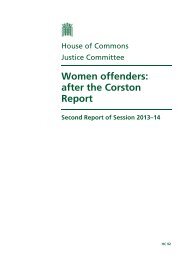Minority voices: Research into the access and acceptability of ... - MMC
Minority voices: Research into the access and acceptability of ... - MMC
Minority voices: Research into the access and acceptability of ... - MMC
- No tags were found...
Create successful ePaper yourself
Turn your PDF publications into a flip-book with our unique Google optimized e-Paper software.
The way that some voluntary sector projects ‘networked’ at <strong>the</strong> community level, sharinginformation about what <strong>the</strong>y <strong>of</strong>fered through avenues used by young people such as localclubs, was also thought to be important in giving young people <strong>the</strong> confidence to use <strong>the</strong>m.! Staff skills, training <strong>and</strong> confidence to deliver services to young peoplefrom Black <strong>and</strong> minority ethnic groupsThere were mixed views with regard to whe<strong>the</strong>r staff had sufficient knowledge <strong>and</strong> skills toaddress <strong>the</strong> mental health needs <strong>of</strong> young people from Black <strong>and</strong> minority ethnic groups.Some services, where <strong>the</strong>y had managed to attract staff from different ethnic backgrounds <strong>and</strong>where <strong>the</strong>y were able to <strong>of</strong>fer support in a range <strong>of</strong> different languages, felt reasonablyconfident but highlighted that:“Individual teams are at different stages in <strong>the</strong>ir capacity to meet <strong>the</strong> needs <strong>of</strong> minority ethnicgroups.” (CAMHS respondent)This imbalance could make referring young people on to o<strong>the</strong>r services or teams problematic.Where staff did not feel that <strong>the</strong>y had adequate skills, limitations in existing training werenoted, in particular that pr<strong>of</strong>essional mental health training remains very Eurocentric <strong>and</strong> doesnot sufficiently address cross-cultural contexts. What little that is <strong>of</strong>fered was described as‘very basic’ <strong>and</strong> was not <strong>of</strong>fered on a regular basis. O<strong>the</strong>r staff said <strong>the</strong>y had received notraining specific to <strong>the</strong> needs <strong>of</strong> Black <strong>and</strong> minority ethnic groups <strong>and</strong> one reason for this was alack <strong>of</strong> relevant organisations with <strong>the</strong> appropriate knowledge that could provide training. Itwas also pointed out that attending conferences <strong>and</strong> workshops is:“not <strong>the</strong> same as being immersed in a culture. The more distant <strong>the</strong> client’s culture from <strong>the</strong>clinician’s <strong>the</strong> more difficult it becomes to underst<strong>and</strong> <strong>the</strong> client’s needs <strong>and</strong> provide effectiveinterventions. This is why it is so important to have minority ethnic group staff…” (CAMHSrespondent)A common <strong>the</strong>me in <strong>the</strong> responses to questions exploring what training staff had received wasthat <strong>the</strong>y had learnt ‘on <strong>the</strong> job’ or were ‘doing <strong>the</strong>ir best’ in an area that is not given priorityor sufficient time. A number described acquiring <strong>the</strong>ir knowledge through <strong>the</strong>ir own initiative,by talking to colleagues or staff in o<strong>the</strong>r services:“Most learning comes from this informal route, by discussing with o<strong>the</strong>r colleagues in <strong>the</strong> samesituation <strong>and</strong> sharing ideas <strong>and</strong> concerns…” (CAMHS respondent)Ano<strong>the</strong>r important point raised by a number <strong>of</strong> respondents was that it is difficult tobenchmark what is ‘sufficient’ in terms <strong>of</strong> skills <strong>and</strong> training. There is also a danger in staffassuming <strong>the</strong>y have become ‘experts’ in an area where <strong>the</strong>re needs to be ongoing learning indeveloping relevant knowledge <strong>and</strong> skills, including in underst<strong>and</strong>ing <strong>the</strong> subtleties <strong>of</strong> crossculturalcommunication <strong>and</strong> inter-generational variations in views towards mental health. Itwas also emphasised that staff attitudes <strong>and</strong> approach to working with young people fromBlack <strong>and</strong> minority ethnic groups are at least as important as acquiring relevant knowledge<strong>and</strong> skills <strong>and</strong> that <strong>the</strong>re is a difficult balance between acquiring <strong>the</strong> latter while refraining fromcreating or applying stereotypes.Training needs <strong>of</strong> staff in voluntary sector projectsAlongside <strong>the</strong> many comments about deficits in CAMH staff skills <strong>and</strong> training in underst<strong>and</strong>ingcultural <strong>and</strong> religious diversity, ano<strong>the</strong>r important area <strong>of</strong> concern emerged in <strong>the</strong> dataga<strong>the</strong>red. This related to <strong>the</strong> knowledge <strong>and</strong> underst<strong>and</strong>ing <strong>of</strong> mental health amongst staffworking in voluntary sector projects with young people. A number <strong>of</strong> respondents from thissector highlighted that <strong>the</strong>y needed more training so that <strong>the</strong>y would be able to identify mentalhealth difficulties in <strong>the</strong> young people <strong>the</strong>y were working with, <strong>and</strong> thus would be able tosupport <strong>the</strong>m appropriately, including where necessary, referring <strong>the</strong>m on to specialist CAMHS.Staff support in working with young people from Black <strong>and</strong> minority ethnic groupsAgain, <strong>the</strong>re were mixed views about this issue that highlighted <strong>the</strong> different levels <strong>of</strong> capacityfor working with this client group amongst CAMHS across <strong>the</strong> country. Some staff stated that<strong>Minority</strong> Voices <strong>Research</strong> Report35
















